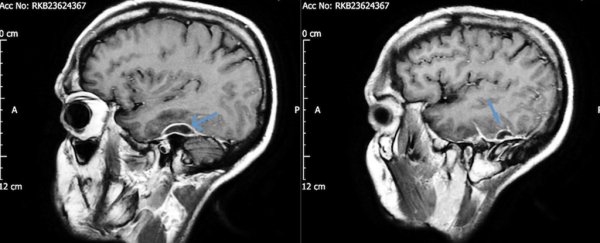Just in case you needed yet another reason to stop cleaning your ears with cotton buds (aka Q-Tips), one man's run-in with a severe and potentially life-threatening infection in his skull may give you pause.
In a newly published case report, doctors detail how an otherwise healthy 31-year-old man was brought to their hospital's emergency department in an ambulance after collapsing.
Upon arriving, he experienced seizures, and physical examinations showed he was confused, drowsy, and occupying an altered state of consciousness.
Later, he revealed he had felt headaches and nausea for several days, during which time he struggled to remember names. Somewhat more ominously, he admitted feeling "intermittent left ear pain and hearing loss" for the past five years.
When the doctors ran a CT scan on the man's skull, they discovered pus-filled abscesses in the tissue surrounding his brain, and discharge from one of his ears revealed the culprit behind the infection: Pseudomonas aeruginosa, a dangerous disease-causing pathogen.
In this case, the medical team think P. aeruginosa was responsible for the man's condition, called Necrotising otitis externa (NOE, aka malignant otitis externa), which affects tissue in the external auditory canal (EAC).
But how did this nasty bacterium get inside the man's skull?
A physical examination of the man's ear canal hints at the most likely answer: a fragment of a cotton bud, that had been stuck in the man's head for who knows how long – but possibly years, if his earlier symptoms of pain and hearing loss are any guide.
The risk of infections developing from foreign bodies lodged inside the EAC is a risk factor for otitis externa (inflammation of the ear canal, aka 'swimmer's ear'), the researchers explain in their report, but has never been documented as causing NOE.
Luckily for the patient, removal of the cotton bud and a huge amount of antibiotics delivered over the course of eight weeks to treat his infection fixed the serious neurological problems he was experiencing.
"At the completion of his course of antibiotics, the patient remained systemically well with no neurological deficit and no residual ear symptoms," the authors write.
"Most importantly, he is no longer using cotton buds to clean his ears!"
While the man's harsh lesson may provoke some amusement, the researchers say his experience is just the latest evidence of why people shouldn't put things in their ears, even if they're intending to internally clean them (which actually isn't necessary).
"The use of cotton buds inside ears is common and has long been recognised to cause several complications including trauma, tympanic membrane perforation, impacted earwax, infection, and retention of the cotton bud," the report states.
"The present case further reiterates the dangers of cotton bud use, and the importance of foreign body removal if identified in the EAC."
The findings are reported in BMJ Case Reports.
